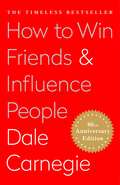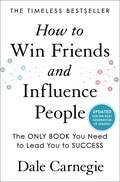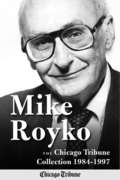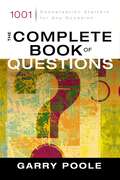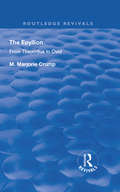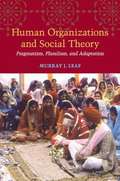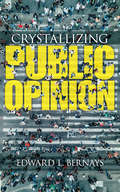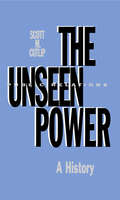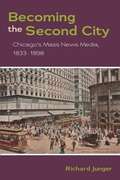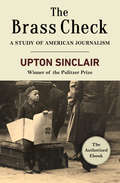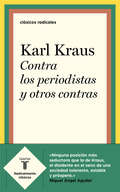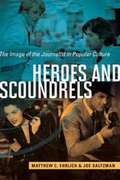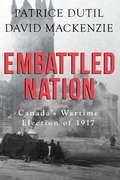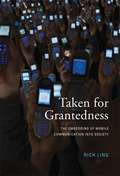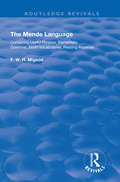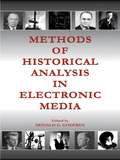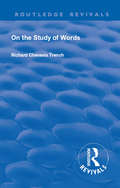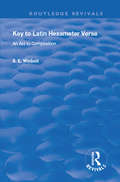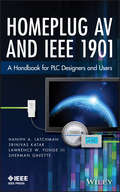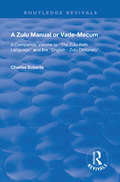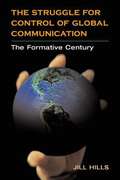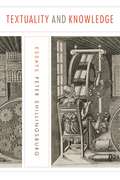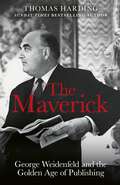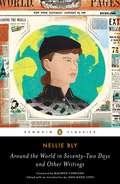- Table View
- List View
How To Win Friends and Influence People: Large Print Edition (Deluxe Hardbound Edition Ser.)
by Dale CarnegieYOU CAN GO AFTER THE JOB YOU WANT...AND GET IT! YOU CAN TAKE THE JOB YOU HAVE...AND IMPROVE IT! YOU CAN TAKE ANY SITUATION YOU'RE IN...AND MAKE IT WORK FOR YOU! For more than sixty years the rock-solid, time-tested advice in this book has carried thousands of now famous people up the ladder of success in their business and personal lives. Now this previously revised and updated bestseller is available as eBook for the first time to help you achieve your maximum potential throughout the next century! Learn: * THREE FUNDAMENTAL TECHNIQUES IN HANDLING PEOPLE* THE SIX WAYS TO MAKE PEOPLE LIKE YOU* THE TWELVE WAYS TO WIN PEOPLE TO YOUR WAY OF THINKING* THE NINE WAYS TO CHANGE PEOPLE WITHOUT AROUSING RESENTMENT
How to Win Friends and Influence People: Updated For the Next Generation of Leaders (Deluxe Hardbound Edition Ser.)
by Dale CarnegieUpdated for the first time in more than forty years, Dale Carnegie&’s timeless bestseller How to Win Friends and Influence People—a classic that has improved and transformed the personal and professional lives of millions.This new edition of the most influential self-help book of the last century has been updated under the care of Dale&’s daughter, Donna, introducing changes that keep the book fresh for today&’s readers, with priceless material restored from the original 1936 text. One of the best-known motivational guides in history, Dale Carnegie&’s groundbreaking publication has sold tens of millions of copies, been translated into almost every known written language, and has helped countless people succeed. Carnegie&’s rock-solid, experience-tested advice has remained relevant for generations because he addresses timeless questions about the art of getting along with people. How to Win Friends and Influence People teaches you: -How to communicate effectively -How to make people like you -How to increase your ability to get things done -How to get others to see your side -How to become a more effective leader -How to successfully navigate almost any social situation -And so much more! How to Win Friends and Influence People is a historic bestseller for one simple reason: Its crucial life lessons, conveyed through engaging storytelling, have shown readers how to become who they wish to be. With the newly updated version of this classic, that&’s as true now as ever.
Speech-Making
by James A. WinansThere is no entirely satisfactory term to describe our subject. An earlier work of mine is entitled Public Speaking, a term some object to on the ground that public limits the field too much, for we are concerned with speeches addressed to groups of any size, whether audiences of thousands in public halls, or small groups in committee rooms or wherever people meet for discussion with closed doors.
Mike Royko: The Chicago Tribune Collection 1984-1997
by Mike Royko John Kass Chicago Tribune StaffMike Royko: The Chicago Tribune Collection 1984-1997 is an expansive new volume of the longtime Chicago news legend's work. Encompassing thousands of his columns, all of which originally appeared in the Chicago Tribune, this is the first collection of Royko work to solely cover his time at the Tribune. Covering politics, culture, sports, and more, Royko brings his trademark sarcasm and cantankerous wit to a complete compendium of his last 14 years as a newspaper man.Organized chronologically, these columns display Royko's talent for crafting fictional conversations that reveal the truth of the small-minded in our society. From cagey political points to hysterical take-downs of "meatball" sports fans, Royko's writing was beloved and anticipated anxiously by his fans. In plain language, he "tells it like it is" on subjects relevant to modern society. In addition to his columns, the book features Royko's obituary and articles written about him after his death, telling the tale of his life and success.This ultimate collection is a must-read for Royko fans, longtime Chicago Tribune readers, and Chicagoans who love the city's rich history of dedicated and insightful journalism.
The Complete Book of Questions: 1001 Conversation Starters for Any Occasion
by Garry PooleThis book provides groups with 1,001 engaging and thought-provoking icebreaker questions to start and sustain meaningful conversations.
The Epyllion: From Theocritus to Ovid (Routledge Revivals)
by M. Marjorie CrumpPublished in 1931: The Epyllion From Theocritus to Ovid discusses Greek Epics along with extracts of Poems.
Human Organizations and Social Theory: Pragmatism, Pluralism, and Adaptation
by Murray J. LeafIn the 1930s, George Herbert Mead and other leading social scientists established the modern empirical analysis of social interaction and communication, enabling theories of cognitive development, language acquisition, interaction, government, law and legal processes, and the social construction of the self. However, they could not provide a comparably empirical analysis of human organization. The theory in this book fills in the missing analysis of organizations and specifies more precisely the pragmatic analysis of communication with an adaptation of information theory to ordinary unmediated communications. The study also provides the theoretical basis for understanding the success of pragmatically grounded public policies, from the New Deal through the postwar reconstruction of Europe and Japan to the ongoing development of the European Union, in contrast to the persistent failure of positivistic and Marxist policies and programs.
Crystallizing Public Opinion
by Edward BernaysFamed as "the father of public relations," Edward Bernays pioneered the technique of working to change attitudes rather than just selling products. In this 1923 classic, the first book ever written about the public relations industry, he delineates the approaches that corporations and governments have taken for the past century to influence social tendencies.Crystallizing Public Opinion identifies the techniques employed by public relations professionals, from authoritative-sounding surveys to persuasive endorsements from opinion leaders, celebrities, and experts. Bernays — whose high-profile clients included Procter & Gamble, General Electric, CBS, NBC, and Time, Inc. — cites examples from his successful campaigns, including a physician-endorsed promotion of bacon as a healthy breakfast option. He quotes leading theorists on the role of herd mentality in the minds of the educated as well as the ignorant, and he explains the value of communicating the right facts at the right time to a targeted audience. Although technology has changed in the years since this book's debut, human nature has not, and these principles remain of timeless value to business and marketing professionals, students of public relations, and other readers.
The Unseen Power: A History (Routledge Communication Series)
by Scott M. CutlipBased largely on primary sources, this book presents the first detailed history of public relations from 1900 through the 1960s. The author utilized the personal papers of John Price Jones, Ivy L. Lee, Harry Bruno, William Baldwin III, John W. Hill, Earl Newsom as well as extensive interviews -- conducted by the author himself -- with Pendleton Dudley, T.J. Ross, Edward L. Bernays, Harry Bruno, William Baldwin, and more. Consequently, the book provides practitioners, scholars, and students with a realistic inside view of the way public relations has developed and been practiced in the United States since its beginnings in mid-1900. For example, the book tells how: * President Roosevelt's reforms of the Square Deal brought the first publicity agencies to the nation's capital. * Edward L. Bernays, Ivy Lee, and Albert Lasker made it socially acceptable for women to smoke in the 1920s. * William Baldwin III saved the now traditional Macy's Thanksgiving Day parade in its infancy. * Ben Sonnenberg took Pepperidge Farm bread from a small town Connecticut bakery to the nation's supermarket shelves -- and made millions doing it. * Two Atlanta publicists, Edward Clark and Bessie Tyler, took a defunct Atlanta bottle club, the Ku Klux Klan, in 1920 and boomed it into a hate organization of three million members in three years, and made themselves rich in the process. * Earl Newsom failed to turn mighty General Motors around when it was besieged by Ralph Nader and Congressional advocates of auto safety. This book documents the tremendous role public relations practitioners play in our nation's economic, social, and political affairs -- a role that goes generally unseen and unobserved by the average citizen whose life is affected in so many ways by the some 150,000 public relations practitioners.
Becoming the Second City: Chicago's Mass News Media, 1833-1898
by Richard JungerBecoming the Second City examines the development of Chicago's press and analyzes coverage of key events in its history to call attention to the media's impact in shaping the city's cultural and historical landscape. In concise, extensively documented prose, Richard Junger illustrates how nineteenth century newspapers acted as accelerants that boosted Chicago's growth in its early history by continually making and remaking the city's image for the public. Junger argues that the press was directly involved in Chicago's race to become the nation's most populous city, a feat it briefly accomplished during the mid-1890s before the incorporation of Greater New York City irrevocably recast Chicago as the "Second City. " The book is populated with a colorful cast of influential figures in the history of Chicago and in the development of journalism. Junger draws on newspapers, personal papers, and other primary sources to piece together a lively portrait of the evolving character of Chicago in the nineteenth century. Highlighting the newspaper industry's involvement in the business and social life of Chicago, Junger casts newspaper editors and reporters as critical intermediaries between the elite and the larger public and revisits key events and issues including the Haymarket Square bombing, the 1871 fire, the Pullman Strike, and the World's Columbian Exposition in 1893.
The Brass Check: A Study of American Journalism (American Journalists Ser.)
by Upton SinclairA muckraking exposé of corruption in American journalism from the Pulitzer Prize-winning author of The Jungle Upton Sinclair dedicated his life to documenting the destructive force of unbridled capitalism. In this influential study, he takes on the effect of money and power on mass media, arguing that the newspapers, magazines, and wire services of the Progressive era formed "a class institution serving the rich and spurning the poor." In the early twentieth century, a "brass check" was a token purchased by brothel patrons. By drawing a comparison between journalists and prostitutes, Sinclair highlights the total control publishers such as William Randolph Hearst exerted over their empires. Reporters and editors were paid to service the financial and political interests of their bosses, even if that meant misrepresenting the facts or outright lying. Sinclair documents specific cases, including the Ludlow Massacre of 1914 and the Red Scare whipped up by Hearst's New York Journal and other newspapers, in which major news outlets ignored the truth in favor of tabloid sensationalism. Sinclair considered The Brass Check to be his most important and most dangerous book. Nearly a century later, his impassioned call for reform is timelier than ever. This ebook has been authorized by the estate of Upton Sinclair.
Contra los periodistas y otros contras
by Karl Kraus«Ninguna posición más seductora que la de Kraus, el disidente en el seno de una sociedad tolerante, estable y próspera.»Miguel Ángel Aguilar «Quien sea capaz de escribir aforismos no debiera desparramarse en artículos», afirma Karl Kraus, quien con gran inteligencia, ironía y capacidad de síntesis se despachó en estos textos contra la moral imperante, los políticos, la religión, la decadencia de la cultura y del lenguaje, los estetas, y por supuesto los periodistas y los medios de comunicación. Deslumbrantes, oportunas, a veces irritantes y siempre impertinentes, sus advertencias resuenan furiosamente en nuestro presente. Karl Kraus (Ji?ín, actual República Checa, 1874 - Viena, 1936) fue un eminente escritor y periodista conocido como ensayista, aforista, dramaturgo y poeta. Gran polemista, tuvo por principal arma Die Fackel, revista de gran audiencia que editó y escribió casi en solitario desde 1899 y durante treinta y siete años. Figuras como Schönberg, Musil, Canetti, Wittgenstein o Adorno esperaban impacientes la aparición del siguiente número. Reseñas:«Ninguna posición más seductora que la de Kraus, el disidente en el seno de una sociedad tolerante, estable y próspera.»Miguel Ángel Aguilar «Los periodistas representan la relajación del estilo y la falta de moralidad de la profesión. Kraus es el redentor; mientras Kraus exista y fulmine, todo está controlado.»Robert Musil «El mayor satírico en lengua alemana del siglo XX.»Isidoro Reguera
Heroes and Scoundrels: The Image of the Journalist in Popular Culture
by Matthew C. Ehrlich Joe SaltzmanWhether it's the rule-defying lifer, the sharp-witted female newshound, or the irascible editor in chief, journalists in popular culture have shaped our views of the press and its role in a free society since mass culture arose over a century ago. Drawing on portrayals of journalists in television, film, radio, novels, comics, plays, and other media, Matthew C. Ehrlich and Joe Saltzman survey how popular media has depicted the profession across time. Their creative use of media artifacts provides thought-provoking forays into such fundamental issues as how pop culture mythologizes and demythologizes key events in journalism history and how it confronts issues of race, gender, and sexual orientation on the job. From Network to The Wire, from Lois Lane to Mikael Blomkvist, Heroes and Scoundrels reveals how portrayals of journalism's relationship to history, professionalism, power, image, and war influence our thinking and the very practice of democracy.
Embattled Nation: Canada's Wartime Election of 1917
by David Mackenzie Patrice DutilEmbattled Nation explores Canada’s tense wartime election of 1917. Amidst the drama of the First World War, Canada’s most divisive election ever raised pivotal questions about Canada’s place in the war and the world. This book examines the issues, people, and events behind one of the most important elections in Canada’s history.
Taken for Grantedness
by Rich LingWhy do we feel insulted or exasperated when our friends and family don't answer their mobile phones? If the Internet has allowed us to broaden our social world into a virtual friend-net, the mobile phone is an instrument of a more intimate social sphere. The mobile phone provides a taken-for-granted link to the people to whom we are closest; when we are without it, social and domestic disarray may result. In just a few years, the mobile phone has become central to the functioning of society. In this book, Rich Ling explores the process by which the mobile phone has become embedded in society, comparing it to earlier technologies that changed the character of our social interaction and, along the way, became taken for granted. Ling, drawing on research, interviews, and quantitative material, shows how the mobile phone (and the clock and the automobile before it) can be regarded as a social mediation technology, with a critical mass of users, a supporting ideology, changes in the social ecology, and a web of mutual expectations regarding use. By examining the similarities and synergies among these three technologies, Ling sheds a more general light on how technical systems become embedded in society and how they support social interaction within the closest sphere of friends and family
The Mende Language: Containing Useful Phrases, Elementary Grammar, Short Vocabularies, Reading Materials (Routledge Revivals)
by F.W.H. MigeodFirst published in 1908, this volume emerged in the midst of the British Protectorate of Sierra Leone. The author, F.W.H. Migeod, studied the Mende nation in eastern Sierra Leone and followed the example of the grammar (1882) and vocabulary (1884) published by Dr. Schoen in using the southern form of the Mende language. Beginning with an introduction to the recent history, culture and characteristics of the Mende nation and Sierra Leone, this volume covers useful phrases, grammar, vocabulary and example reading materials including stories and songs collected from native speakers.
Methods of Historical Analysis in Electronic Media (Routledge Communication Series)
by Donald G. GodfreyMethods of Historical Analysis in Electronic Media provides a foundation for historical research in electronic media by addressing the literature and the methods--traditional and the eclectic methods of scholarship as applied to electronic media. It is about history--broadcast electronic media history and history that has been broadcast, and also about the historiography, research written, and the research yet to be written.Divided into five parts, this book:*addresses the challenges in the application of the historical methods to broadcast history;*reviews the various methods appropriate for electronic-media research based on the nature of the object under study;*suggests new approaches to popular historical topics;*takes a broad topical look at history in broadcasting; and*provides a broad overview of what has been accomplished, a historian's challenges, and future research.Intended for students and researchers in broadcast history, Methods of Historical Analysis in Electronic Media provides an understanding of the qualitative methodological tools necessary for the study of electronic media history, and illustrates how to find primary sources for electronic media research.
Revival: On the Study of Words (Routledge Revivals)
by Richard Chenevix TrenchFirst published in 1904, this book contains the conclusions of a series of lectures exploring the moral and historical value of single words. The author argues that, just as wisdom and knowledge are discoverable in books, so too are these treasures to be found in individual words themselves.
Key to Latin Hexameter Verse: An Aid to Composition (Routledge Revivals)
by S. E. WinboltOriginally published in 1903.
Homeplug AV and IEEE 1901
by Larry Yonge Sherman Gavette Srinivas Katar Haniph A. LatchmanThe only authorized book explaining the HomePlug networking standardsHomePlug is a growing technology for creating high-speed Power Line Communication (PLC) networks by transmitting data over in-home or in-office power lines. Users only need to plug adapters into wall outlets to create an instant network of computers, printers, routers, home entertainment devices, and appliance control systems.HomePlug AV and IEEE 1901: A Handbook for PLC Designers and Users provides for the first time an opportunity for non-members of the HomePlug Alliance to gain in-depth insight into the design and operation of the HomePlug standards. Offering a clear and simple description of the standards, this groundbreaking resource presents HomePlug AV and the associated IEEE 1901 standards in terms more readily understood by a much wider audience, including nontechnical managers, engineers, students, and HomePlug designers.The book details the many benefits of HomePlug AV, including:An affordable, secure alternative or complement to WiFi--especially in buildings where WiFi reception is poor or running new network wires is impracticalHigher potential data transmission rates up to 200 MbpsSupport for multimedia applications such as HDTV and VoIPThe book also provides an overview of the HomePlug Green PHY standard that is targeted for use in smart energy applications, and the HomePlug AV 2.0 standard that operates at up to 1.5 Gbps.An essential tool for designers of HomePlug devices, network administrators, and individual users of HomePlug networks who need to understand the features and capabilities of HomePlug, HomePlug AV and IEEE 1901: A Handbook for PLC Designers and Users will also prove useful for researchers in academia and the power line communications industry.
A Zulu Manual or Vade-Mecum: A Companion Volume to ''The Zulu-Kafir Language'', And The '' English - Zulu Dictonary''. (Routledge Revivals)
by Charles RobertsPublished in 1900, this book provides a companion volume to the Zulu Kafir Language and the English Zulu Dictionary. Including a dictionary and examples of language structure and grammar, this book makes Zulu accessible to all levels of learner.
The Struggle for Control of Global Communication: THE FORMATIVE CENTURY
by Jill HillsTracing the development of communication markets and the regulation of international communications from the 1840s through World War I, Jill Hills examines the political, technological, and economic forces at work during the formative century of global communication. The Struggle for Control of Global Communication analyzes power relations within the arena of global communications from the inception of the telegraph through the successive technologies of submarine telegraph cables, ship-to-shore wireless, broadcast radio, shortwave wireless, the telephone, and movies with sound. Global communication began to overtake transportation as an economic, political, and social force after the inception of the telegraph, which shifted communications from national to international. From that point on, says Hills, information was a commodity and ownership of the communications infrastructure became valuable as the means of distributing information. The struggle for control of that infrastructure occurred in part because the growing economic power of the United States was hindered by British control of communications. Hills outlines the technological advancements and regulations that allowed the United States to challenge British hegemony and enter the global communications market. She demonstrates that control of global communication was part of a complex web of relations between and within the government and corporations of Britain and the United States. Detailing the interplay between U.S. federal regulation and economic power, Hills shows how communication technologies have been shaped by these forces and fosters an understanding of contemporary systems of power in global communications.
Textuality and Knowledge: Essays (Penn State Series in the History of the Book)
by Peter ShillingsburgIn literary investigation all evidence is textual, dependent on preservation in material copies. Copies, however, are vulnerable to inadvertent and purposeful change. In this volume, Peter Shillingsburg explores the implications of this central concept of textual scholarship.Through thirteen essays, Shillingsburg argues that literary study depends on documents, the preservation of works, and textual replication, and he traces how this proposition affects understanding. He explains the consequences of textual knowledge (and ignorance) in teaching, reading, and research—and in the generous impulses behind the digitization of cultural documents. He also examines the ways in which facile assumptions about a text can lead one astray, discusses how differing international and cultural understandings of the importance of documents and their preservation shape both knowledge about and replication of works, and assesses the dissemination of information in the context of ethics and social justice. In bringing these wide-ranging pieces together, Shillingsburg reveals how and why meaning changes with each successive rendering of a work, the value in viewing each subsequent copy of a text as an original entity, and the relationship between textuality and knowledge.Featuring case studies throughout, this erudite collection distills decades of Shillingsburg’s thought on literary history and criticism and appraises the place of textual studies and scholarly editing today.
The Maverick: George Weidenfeld and the Golden Age of Publishing
by Thomas HardingBorn into a Jewish family in Vienna in 1919, George Weidenfeld fled to England in 1938 to escape the Nazi regime. There he began a career in publishing that would make him one of the most influential figures in the industry. Over the course of his long and illustrious career he championed some of the most important voices of the twentieth century, from Vladimir Nabokov, Mary McCarthy and Saul Bellow to Harold Wilson, Isaiah Berlin and Henry Kissinger.But what do we know about the man himself? Was he, as described by some, the 'greatest salesperson', 'the world's best networker', 'the publisher's publisher' and 'a great intellectual'? Was his lifelong effort to be the world's most famous host a cover for his desperate loneliness? Who, in fact, was the real George Weidenfeld and how did he rise so successfully within the ranks of London and New York society? Providing a full, unvarnished and at times difficult history of this complex man, this first biography of a titan of culture is also a story of resilience, determination and the power of ideas to shape history.
Around the World in Seventy-Two Days and Other Writings
by Nellie BlyA collection of the articles and writings of famed American journalist Nellie Bly. .
